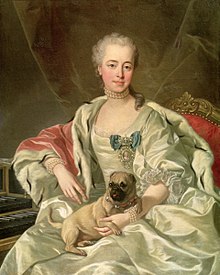This article needs additional citations for verification. (July 2022) |
Ekaterina Dmitrievna Golitsyna, née Cantemir (Russian: Екатерина Дмитриевна Голицына; 4 November 1720 – 2 November 1761), was a Russian noblewoman of Moldavian ancestry.[1][2]
Ekaterina Dmitrievna Golitsyna | |
|---|---|
 Portrait of Ekaterina Golitsyna, Charles-André van Loo, 1759. | |
| Born | Екатерина Дмитриевна Кантемир 4 November 1720 Saint Petersburg, Tsardom of Russia |
| Died | 2 November 1761 Paris, Kingdom of France |
| Buried | Annunciation Church of the Alexander Nevsky Lavra |
| Noble family | Cantemirești |
| Spouse(s) | Dmitry Mikhailovich Golitsyn the Younger |
| Father | Dimitrie Cantemir |
| Mother | Anastasiya Trubetskaya |
Biography
editBorn as Ekaterina Dmitrievna Cantemir in Saint Petersburg on 4 November 1720, she was the daughter of the Moldavian prince Dimitrie Cantemir (1673–1723).[1][3] In 1711, her father accepted Russian citizenship and moved to Russia. He received, from Peter I, the title of Grand Duke and in 1717 married Princess Anastasiya Ivanovna Trubetskaya. They had three children, but only Ekaterina reached adulthood, later losing her father when she was only four years old.[4]
In 1744, she became maid of honor, one of the most beautiful, charming and famous women in the entourage of Empress Elizabeth of Russia. In 1745, together with her mother, she went abroad to join her mother's second husband, Ludwig Gruno of Hesse-Homburg. After his death in Berlin, the mother and daughter did not immediately return home. They traveled extensively, lived in Paris for a few years, and, only with the death of their grandfather in 1750, returned to Russia.
Marriage
editHer childhood was very painful, and it is likely that she knew from a young age that she could not have children. For a long time she refused all offers of marriage, and only late in life she married Prince Dmitry Golitsyn,[5] captain of the Izmailovsky Life Guards Regiment. The wedding took place on the 28 January 1751 at the imperial court, a lavish wedding and in the presence of Empress Elizabeth. On the day following the wedding a dinner and ball took place to which 200 people were invited.
In 1755, her mother died. In 1757 they left Russia with their uncle, Ivan Betskoy, arriving in Paris.
In 1760, Prince Dmitry Golitsyn was appointed Russian ambassador to Paris, and Ekaterina became one of the leading women at the royal palace in Versailles and Paris.[6]
Death
editIn 1761 Dmitry Golitsyn obtained a new diplomatic post in Vienna. However, he was unable to accept the post due to his wife's serious illness.
She died in Paris on 2 November 1761. The following year, the princess' remains were transferred to Saint Petersburg and buried in the Church of the Annunciation of the Aleksandr Nevsky Monastery.
References
edit- ^ a b Dulac, Georges (2004). La culture française et les archives russes: une image de l'Europe au XVIIIe siècle (in French). Centre international d'étude du XVIIIe siècle. ISBN 978-2-84559-015-1.
- ^ Dulac, Georges (2007). Les Archives de l'Est et la France des Lumières: Guide des archives (in French). Centre international d'étude du XVIIIe siècle. ISBN 978-2-84559-044-1.
- ^ Les Français en Russie au siècle des Lumières: dictionnaire des Français, Suisses, Wallons et autres francophones en Russie de Pierre le Grand à Paul Ier (in French). Centre international d'étude du XVIIIe siècle. 2011. ISBN 978-2-84559-046-5.
- ^ Klaus Bochmann (2008), Dimitrie Cantemir (in German), Leipziger Universitätsverlag, ISBN 978-3-86583-257-3, retrieved 2021-12-26
- ^ "Geschichte des letztern Krieges zwischen den Russen und den Türken ... (Beylagen.) aus dem Französischen übersetzt". 1778.
- ^ Kleinschmidt, Arthur (1877). "Russland's Geschichte und Politik dargestellt inder Geschichte des russischen hohen Adels".